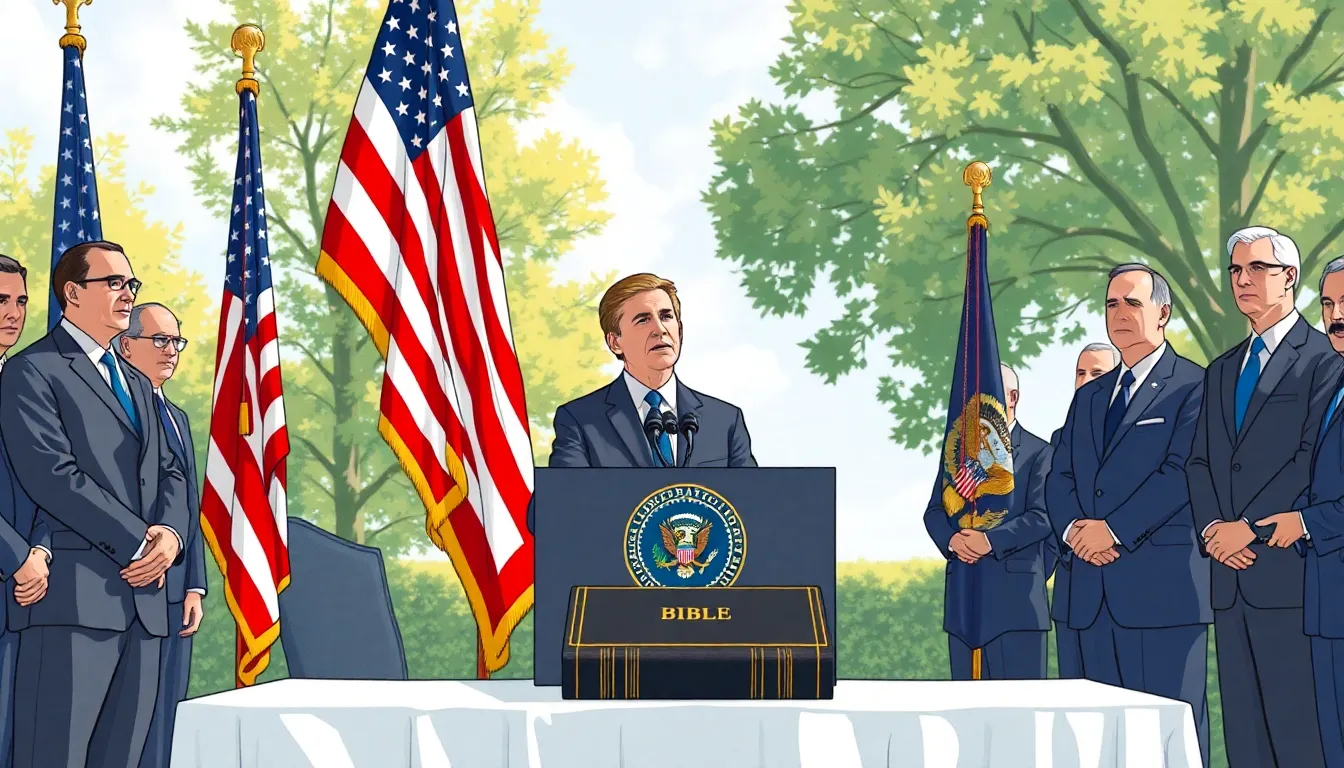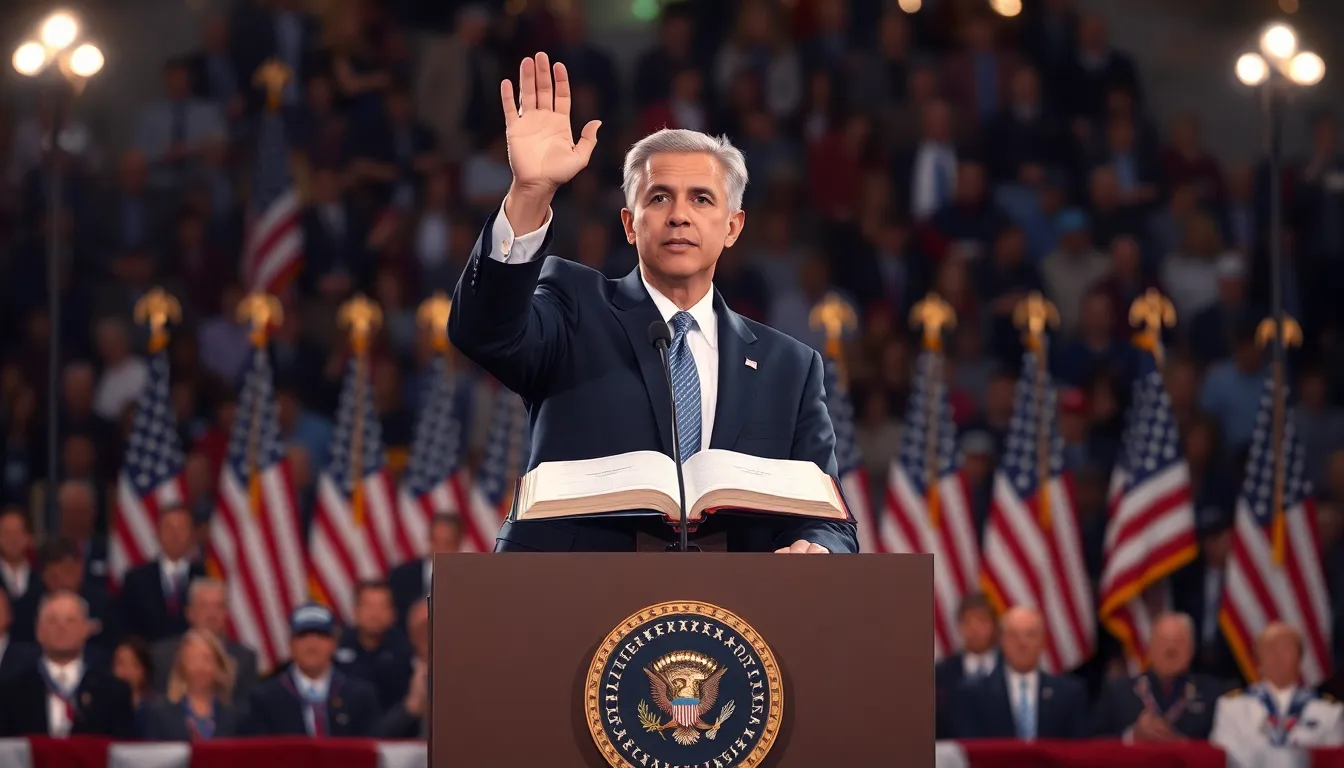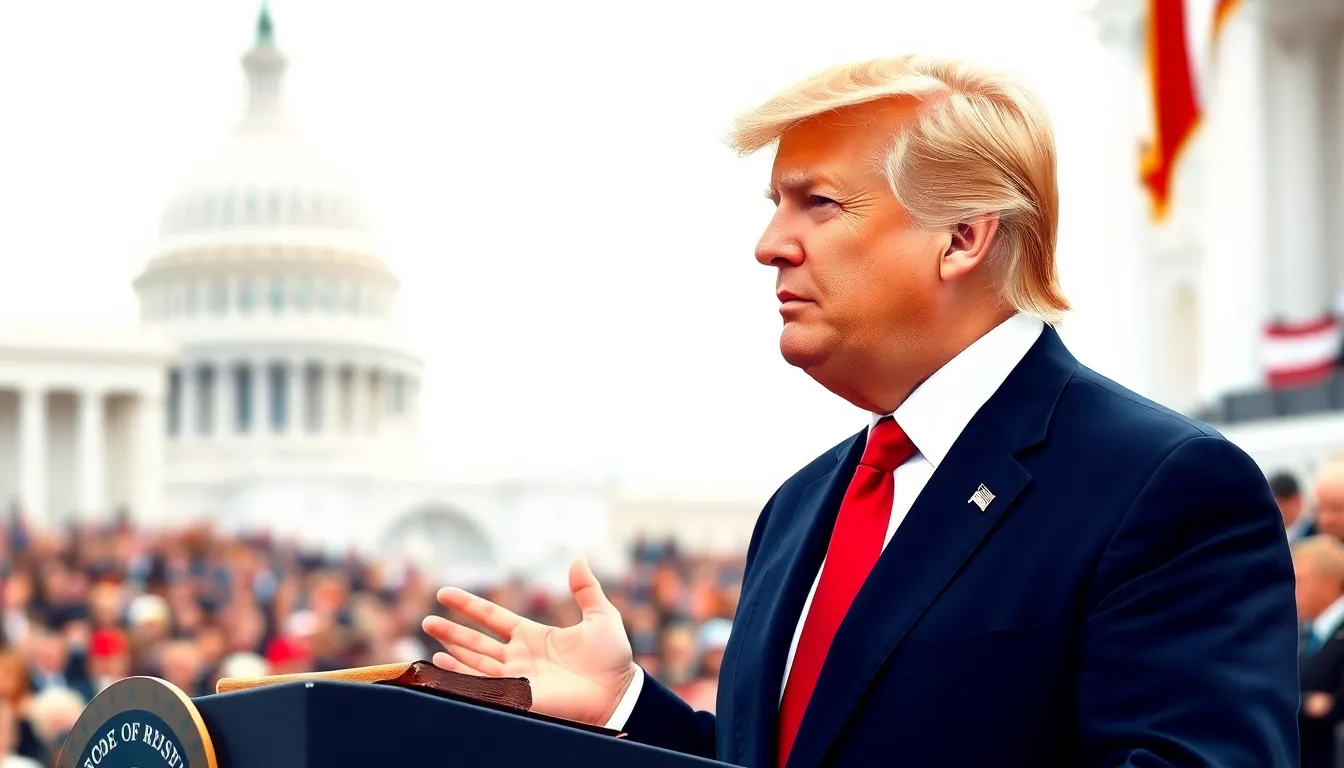In a moment that sparked more debate than a family Thanksgiving dinner, former President Trump took the oath of office without placing his hand on the Bible. Was it a bold move or just a slip-up? The world watched as he raised his right hand, leaving many to wonder if he was channeling some sort of presidential magic trick.
This curious absence of the sacred book has fueled discussions about tradition, faith, and the meaning behind the oath itself. As opinions fly faster than a tweet, it’s time to dive into the details of this eyebrow-raising moment and explore what it really signifies. Buckle up, because this isn’t just about a hand and a book; it’s about the intersection of politics and personal beliefs in America.
Table of Contents
ToggleOverview of the Event
Former President Trump’s choice to take the oath of office without placing his hand on the Bible sparked significant debate. Observers noted the departure from the traditional practice and questioned its implications. Many compared this moment to previous inaugurations, where presidents traditionally upheld this custom. Speculation arose regarding whether this decision reflected a deeper stance on faith or was simply an oversight.
The event took place on January 20, 2017, during Trump’s inauguration, capturing the attention of media and public alike. Some argued the absence of the Bible underscored a shift in American political norms related to religious affirmation. Critics expressed concern that it signified a departure from the intertwining of faith and governance.
Textual analysis of Trump’s inauguration speech revealed references to faith, albeit without the symbolic gesture of placing a hand on the Bible. Irrespective of interpretations, the moment stands as a pivotal point in discussions concerning the role of faith in American politics. Debates continue regarding the significance of such symbols and rituals, reflecting broader societal attitudes toward religion and its influence on public life.
The event not only highlighted Trump’s unique approach but also ignited discourse about the intersection of personal beliefs and traditional practices. This moment reminds Americans of the evolving nature of political customs in a rapidly changing society. Insights gained from the occasion emphasize the importance of examining political symbolism in contemporary discourse.
The Significance of the Bible in Inaugurations


The Bible plays a crucial role in the inauguration of U.S. presidents. It symbolizes a commitment to faith and moral governance. Traditionally, presidents take the oath of office with their hand on the Bible, embracing a long-standing custom that underscores the relationship between religion and politics. Observers often view this act as a public affirmation of one’s beliefs. The absence of this gesture can raise questions about an incoming president’s connection to religious traditions.
Historical Context
Historical practices highlight the importance of the Bible during presidential inaugurations. George Washington set the precedent in 1789 by placing his hand on the Bible while taking the oath. Subsequent presidents followed this tradition, reinforcing the link between faith and political authority. Over time, the Bible’s presence provided a sense of continuity in the American political landscape. Notably, Franklin D. Roosevelt utilized a family Bible during his tenure, showcasing personal significance amid national ceremony. This context shows how traditional practices shape public perception of leadership.
Symbolism in Political Ceremonies
Symbolism plays a significant role in political ceremonies, particularly inaugurations. A hand on the Bible during the oath represents confidence in a higher moral authority. It serves as a visual reaffirmation of promises to uphold the Constitution and serve the people. Missing this element can convey a departure from established norms, stirring public debate. Sometimes, leaders utilize alternative symbols to express their beliefs, leading to varied interpretations of their intentions. Each inauguration provides a unique opportunity to reflect on the evolving relationship between faith and governance in America.
Analysis of Trump’s Inauguration
Trump’s inauguration marked a distinct departure from tradition when he took the oath without placing his hand on the Bible. This moment triggered discussions about the significance of such a choice and its implications for American political norms.
Images and Videos
Photographic evidence from the event shows Trump standing with his right hand raised, while the Bible remains untouched. Videos from the inauguration replay his oath-taking, emphasizing the contrast to past presidents. Observers note a lack of the familiar imagery tied to the tradition of placing a hand on a sacred text. The absence of the Bible turns the focus toward Trump’s actions and the overall tone of the ceremony.
Eyewitness Accounts
Eyewitnesses reported a noticeable reaction from the audience after Trump recited the oath. Some individuals expressed confusion over the missing gesture usually associated with the pledge. Reactions varied, ranging from surprise to critique, highlighting the tension surrounding Trump’s relationship with faith. Attendees recalled discussions about the implications of not adhering to the traditional practice during such a crucial moment.
Reactions and Interpretations
The decision by former President Trump to take the oath of office without placing a hand on the Bible provoked diverse reactions from various sectors.
Political Reactions
Critics within the political sphere expressed alarm over Trump’s deviation from established norms. Some lawmakers claimed this absence undermined faith’s role in governance. Conservatives pointed out that such actions might alienate religious constituents. Democratic leaders seized the moment to highlight the significance of faith in political leadership. Observers noted that Trump’s choice could reflect a broader shift in political discourse, reducing the emphasis on tradition in favor of individualism. Political commentators frequently debated the implications, speculating that this act deepened America’s divide on issues related to religion and politics.
Public Responses
Responses from the public varied widely, showcasing a spectrum of opinions. Many individuals reported feeling confused during the inauguration when Trump did not perform the expected gesture. Some supporters hailed his decision as a break from tradition, indicating a modern approach to leadership. Others, however, expressed disappointment, feeling that the lack of a Biblical reference diminished the event’s solemnity. Online discussions spurred significant debate, with social media platforms flooded with reactions ranging from supportive to critical. Amidst this discourse, the absence of the Bible during the oath highlighted differing views on the connection between personal beliefs and public responsibilities.
The moment when Trump took the oath without placing his hand on the Bible remains a significant point of discussion in American political culture. This departure from tradition has sparked debates about the role of faith in governance and the symbolism behind such gestures. Observers are left contemplating how this choice reflects broader societal attitudes towards religion and its influence on public life.
As the discourse continues, the implications of this moment extend beyond personal beliefs, challenging the norms that have historically defined presidential inaugurations. The varied reactions highlight a divided perspective on faith’s place in politics, illustrating how Trump’s approach has reshaped conversations around leadership and religious commitment in America.








